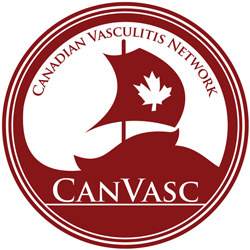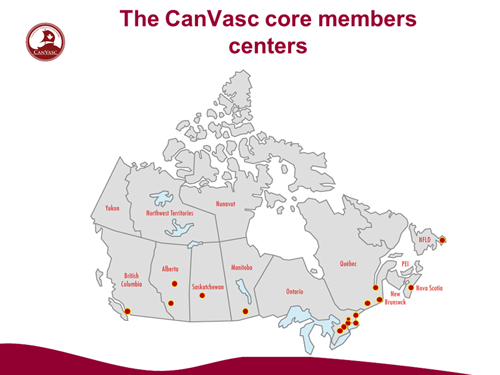Spring 2016 (Volume 26, Number 1)
Update on Recent CanVasc Initiatives
By Christian Pagnoux, MD, MSc, MPH
Download PDF

The Canadian Vasculitis Network (CanVasc) was founded in November 2010. Its core committee includes more than 20 physicians from various medical specialties across Canada, as well as many collaborators, all of whom have expertise and interest in vasculitis. CanVasc ultimately aims to optimize the management of vasculitis in Canada through the development of—or assistance with the development of—guidelines, educational materials on vasculitides, and awareness programs for healthcare providers.
The core members of CanVasc have initiated and achieved several important projects. The first CanVasc recommendations, for the diagnosis and management of anti-neutrophil cytoplasmic antibody (ANCA)-associated vasculitis, have just been published in rheumatology and nephrology journals.1,2 It took almost three years to achieve this major step, which solidifies the national existence of CanVasc and introduces us to the international vasculitis research community. Work is currently under way to develop similar recommendations for Takayasu arteritis, for which dedicated guidelines have been lacking, and for giant cell arteritis, focusing on some specific aspects of its management.
Several tools are available or are under development to help disseminate these recommendations and their practical appendices, promoting their use in routine practice to improve patient outcomes. The number of daily visits
to the CanVasc website (www.canvasc.ca) has regularly increased since its creation; the site offers practical information and resources for healthcare providers. The development of new educational materials (Canadian Vasculitis Learning Initiative [CaVALI]: An Approach To Vasculitis Through Interactive Clinical Cases) will further emphasize how CanVasc initiatives can enhance the training and learning of physicians managing vasculitis.
Several CanVasc centres and core members have been active participants in the North American Vasculitis Clinical Research Consortium (VCRC); stronger connections with this major and longer-standing research network will be nurtured. This collaboration provides further opportunities for Canadian centres—part of the CanVasc network or not—to participate in prospective, international therapeutic studies. Plasma Exchange and Glucocorticoid Dosing In the Treatment of ANCA-associated Vaculitis
(PEXIVAS), driven in Canada by Dr. Michael Walsh, an associated CanVasc core member from Hamilton, Ontario, has been a tremendous success and showed that Canada is now a major player in vasculitis research.3 Other therapeutic studies are coming soon, some designed by our members in collaboration with the VCRC. CanVasc led studies must be conducted in parallel. A few have been completed, including the largest case series on patients with vasculitis and inflammatory bowel disease (IBD).4 CanVasc has just finalized its database for adults with vasculitis, which will allow for various descriptive studies and comparisons with the existing Registry for Childhood Vasculitis (ARCHiVe) database or other international cohorts. Core members have also been involved in the launch of the adult BrainWorks database for patients with suspected central nervous system vasculitis. The pediatric database, developed eight years ago by Dr. Susanne Benseler, CanVasc core member in Calgary, Alberta, has also been very successful.
Hence, it is difficult to summarize what has been initiated and accomplished by all CanVasc core members since 2010. CanVasc is now an established not-for-profit corporation and research network. It needs to keep working hard to sustain its recently acquired position in the vasculitis field. Everyone is welcome to join and help!
References
1. McGeoch L, Twilt M, Famorca L, et al. CanVasc recommendations for the management of antineutrophil cytoplasm antibody (ANCA)-associated vasculitides: Executive summary. Can J Kidney Health Dis 2015; 2:43.
2. McGeoch L, Twilt M, Famorca L, et al. CanVasc Recommendations for the Management of Antineutrophil Cytoplasm Antibody-associated Vasculitides. J Rheumatol 2016; 43(1):97-120.
3. Walsh M, Merkel PA, Peh CA, et al. Plasma exchange and glucocorticoid dosing in the treatment of anti-neutrophil cytoplasm antibody associated vasculitis (PEXIVAS): protocol for a randomized controlled trial. Trials 2013; 14:73.
4. Sy A, Khalidi N, Dehghan N, et al. Vasculitis in patients with inflammatory bowel diseases: A study of 32 patients and systematic review of the literature. Semin Arthritis Rheum 2015.
Christian Pagnoux, MD, MSc, MPH
Founder and Current Director,
CanVasc
Associate Professor,
Vasculitis Clinic,
Division of Rheumatology,
Department of Medicine
Mount Sinai Hospital
Toronto, Ontario

Click here to view larger version of the figure |

